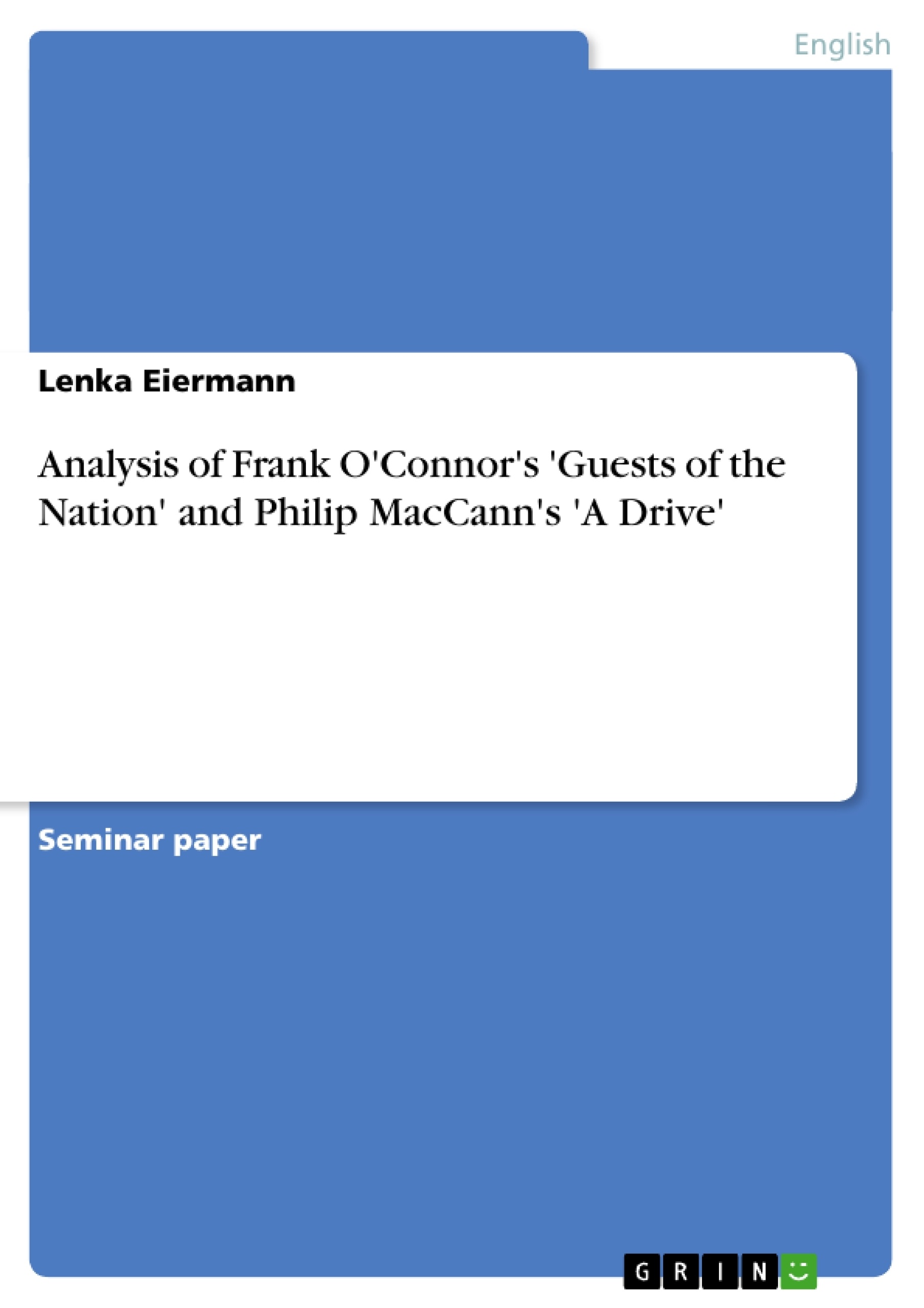In the following essay the short stories “Guests of the Nation“ by Frank O’Connor and “A Drive” by Philip MacCann will be analysed and compared with regard to themes, the use of language, style, narrative voice and narrator characterization.
Frank O’Connor, the author of “Guests of the Nation” was born in Cork, Ireland, in 1903 as Michael O’Donovan. He was interned during the Civil War. O’Connor first published in 1920; his short-story “Guests of the Nation” was published in 1931 in a collection of short-stories of the same name. Frank O’Connor is widely regarded as one of the masters of realistic short-stories in the twentieth century. He is also one of the most important translators of Irish poetry into English. Apart from short stories he wrote novels, literary history, biography, drama, travel books and extensive socially critical journalism. O’Connor’s fiction often deals with war experiences, childhood or priesthood.
Philip MacCann, who wrote the short-story “A Drive”, was born in Manchester, England, in 1966. He grew up in Dublin and studied Creative Writing at the University of East Angia. His first book “The Miracle Shed”, a collection of short-stories published in 1995, won the Rooney Prize for Irish Literature. In 1999 MacCann was named in the Observer newspaper’s list of “21 Writers for the Twenty-First-Century”. He is also a regular writer for magazines and newspapers including “The Guardian”, “Prospect” and “The Spectator”.
Table of Contents
- Introduction
- Guests of the Nation
- Theme of the short-story
- How the story is told
- A Drive
- Theme of the Short Story
- How the Story is told
- A Comparison
- Literature
Objectives and Key Themes
This essay analyzes and compares the short stories “Guests of the Nation” by Frank O'Connor and “A Drive” by Philip MacCann, focusing on themes, language, style, narrative voice, and narrator characterization.
- The complexities of wartime friendships and the conflict between personal relationships and national duty.
- The impact of war on individuals and their perspectives on life.
- The concept of duty and responsibility in wartime.
- The portrayal of the Irish Rebellion and its impact on individuals from both sides of the conflict.
- The use of narrative voice and characterization to explore themes of identity and belonging.
Chapter Summaries
- Introduction: This chapter introduces the essay's focus on analyzing and comparing "Guests of the Nation" and "A Drive," providing brief biographical information about the authors, Frank O'Connor and Philip MacCann.
- Guests of the Nation: This chapter explores the main themes and narrative elements of O'Connor's short story, which centers on two Englishmen, Hawkins and Belcher, held prisoner by a small group of Irish rebels during the Irish Rebellion. It delves into the complexities of their relationships, the conflict between duty and personal relationships, and the challenges of navigating a volatile wartime environment. The chapter also discusses the story's exploration of themes like duty, responsibility, and the impact of war on individual perspectives.
- A Drive: This chapter will examine the main themes and narrative elements of Philip MacCann's short story "A Drive." It will delve into the story's narrative voice, characterization, and how the author uses these elements to explore themes of identity and belonging.
Keywords
Key terms and concepts explored in this essay include: Irish Rebellion, wartime relationships, duty, responsibility, narrative voice, characterization, identity, belonging, friendship, conflict, perspective, Irish short stories, Frank O'Connor, Philip MacCann, Guests of the Nation, A Drive.
- Quote paper
- Lenka Eiermann (Author), 2005, Analysis of Frank O'Connor's 'Guests of the Nation' and Philip MacCann's 'A Drive', Munich, GRIN Verlag, https://www.grin.com/document/36929




